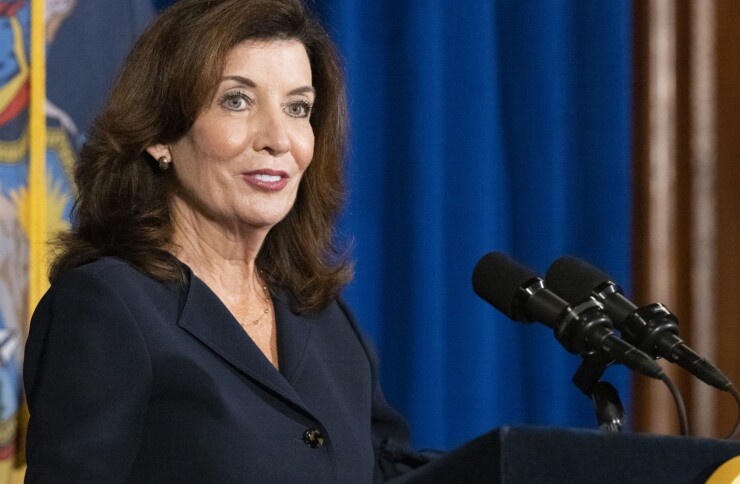Kathy Hochul faces the glare of a highly diverse and fractious state as New York’s 57th governor, the first woman at the helm.
Hochul, 62, a Buffalo native and former congresswoman, took the office at midnight. After nearly seven years as lieutenant governor, she succeeds Andrew Cuomo, who resigned amid a sexual-harassment scandal and still could face related prosecution and civil lawsuits.
Her full plate of crisis management, beyond a credibility gap in Albany, includes the lingering COVID-19 pandemic — and a staffing crisis at the state Department of Health — and uncertainty over economic recovery.
She must also start planning for a budget that critics say has ballooned out of control and is fraught with opaqueness, and grasp mass transit in New York City, including such mega projects as the Penn Station reconstruction and East Side Access.

The transition should not affect state credit, though, said John Ceffalio, senior research analyst for municipals at CreditSights.
“New York State’s credit is very strong and state [general obligation] bonds are trading tight to AAAs. We do not expect to see a meaningful change in the state’s credit due to the ongoing transition.”
S&P Global Ratings, Fitch Ratings and Kroll Bond Rating Agency rate the state’s general obligation bonds AA-plus. Moody’s Investors Service rates them Aa2.
Ceffallio cited Hochul’s “significant” state and local government experience, including a tenure as Erie County clerk, and sees her working smoothly with top lawmakers on fiscal matters.
“The state’s next budget cycle will be during an election year and we’ll watch her budget closely for any signs of change,” he said. New York’s April 1 budget deadline is the earliest for any state.
Hochul, a Democrat, expects to run for a full term next year, and could face a primary challenge from state Attorney General Letitia James, a former New York City public advocate whose report on sexual-harassment allegations against Cuomo triggered his Aug. 10 resignation.
In the New York City region, transit observers will be eager to see how Hochul manages the MTA, its leadership and notably
Federal, state and city officials agreed on an environmental assessment process on Friday.
The MTA operates the region’s subway and bus network, two commuter rail lines and several interborough bridges and tunnels. It is one of the largest municipal issuers with roughly $50 billion of debt.
Shortly before Cuomo resigned, he sponsored a bill to separate the MTA’s chief executive and board chairman positions. The bill has stalled amid pushback from top lawmakers over what they perceived was excessive concentration of power in the governor’s office.
New York Mayor Bill de Blasio, who feuded openly with Cuomo for eight years, met officially with Hochul last week.
De Blasio's advice to the new governor? "Be herself, don't be Andrew Cuomo," he said.
Transparency advocates who long criticized the Cuomo shroud of secrecy over his three terms, will also scrutinize the new governor.
“We don’t know as much as we should,” said Peter Warren, director of research for the free-market leaning think tank Empire Center for Public Policy.
According to Warren, Cuomo did not fully comply with his obligation under state finance law to issue the first quarter financial plan update by July 30.
Warren said former governors Mario Cuomo, George Pataki, Eliot Spitzer and David Paterson generally issued their mid-year reports on schedule or within a day or two of the deadlines.
“All that makes the timely release of these quarterly financials a good opportunity for Kathy Hochul, once she takes the reins, to deliver the ‘fully transparent government’ she’s promised,” he said.
Cuomo, his clock ticking down, spent the weekend coordinating the response to Tropical Storm Henri, a front-and-center type of stage that he always relished. He gave his farewell speech Monday, saying the James report "was designed to be a political firecracker on an explosive topic."





